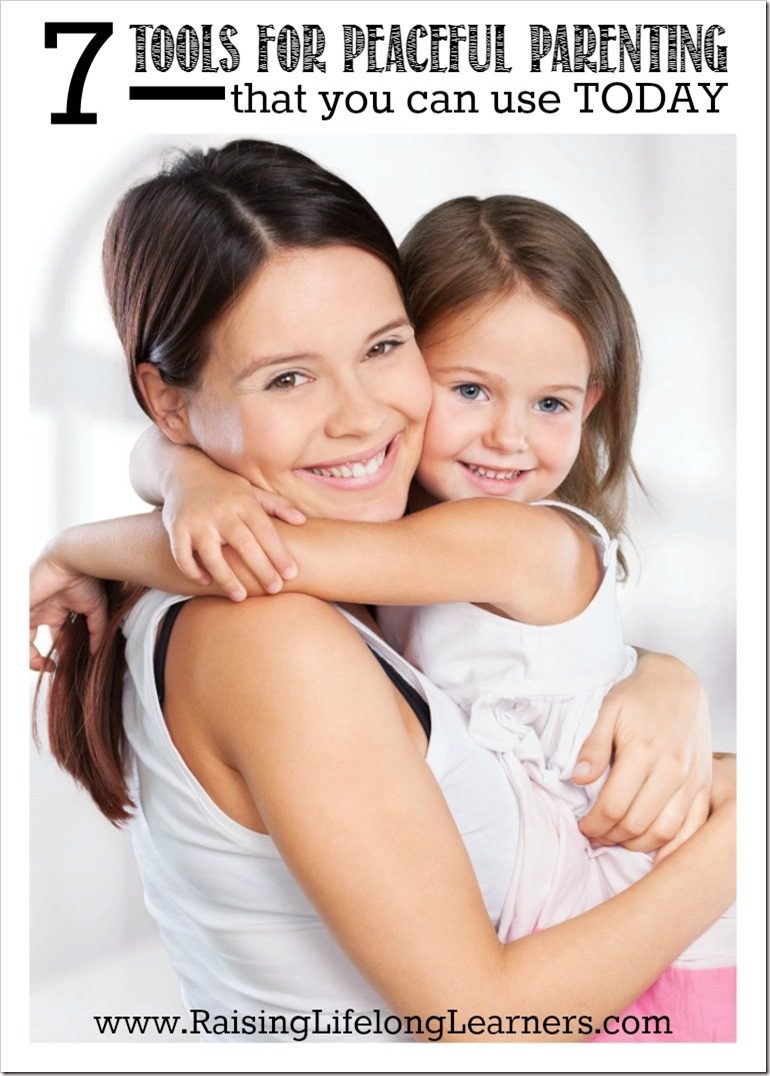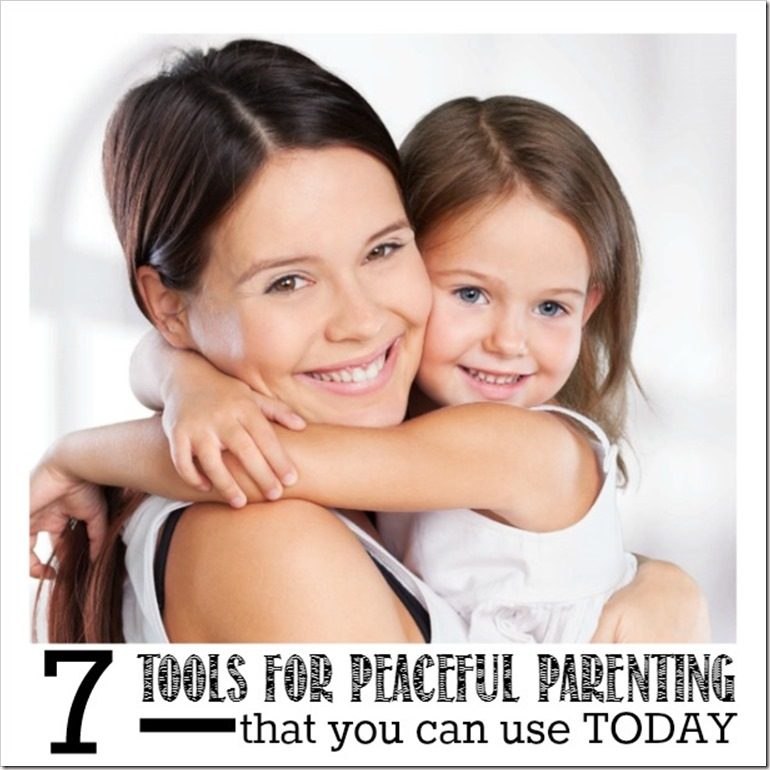7 Tools for Peaceful Parenting that You Can Use Today
Parenting is tough. No matter how rock-solid your discipline strategies are, you probably lose your temper and yell… I know I struggle with this {ahem} from time to time.
Why does this happen, though? Why do we, who love our kiddos more than anything, lose it?
I don’t know about you, but I just get tired.
And, I don’t like who I am when I’m tired. My tone gets mean, and I can hear it, but can’t stop myself from having that edge to my voice.
Even the most well meaning of us parents may find ourselves yelling at our kiddos in a moment of angry frustration. We feel out of control, or like our kids’ behavior has gone on for too long.
But outbursts out of mama tend to feed more outbursts in the kids. I’m resolved to be more peaceful in my approach to discipline this year. I hope you will be too.
Peaceful discipline doesn’t mean no discipline, nor does it mean permissive or ineffective discipline. In fact, when you’re raising intense kiddos, you need to make sure you’re on your game and that you’re staying consistent with what you do, discipline-wise.
When we strive to parent more gently, we need a toolbox of skills to draw from when our kids push the boundaries. Here are some of my favorite tools and tips:
Plan Ahead
One of the principles of good discipline is planning ahead. We we react, we (the parents) tend to lose control, so instead of reacting all the time to our kiddos’ bad choices, sit down and make a list of what behaviors bother you the most.
Pick two or three to work of those to focus on. Then, sit down and talk with your kids about these issues according to his or her maturity level – and problem solve together.
When I taught, I found that my students were often way harder on themselves than I would have been on them. You might be surprised at the solutions your kids come up with.
Journal
Keep a notebook handy and write down behaviors that seem to push your buttons. By stopping to write them down, you’ll break the habit of reacting, giving you a little distance from your emotions. It’ll be much easier to discipline with love and kindness with this perspective.
Level with your kids. Tell them that you’re angry and frustrated, but still want to be fair and loving, so they’ll have to give you a minute to regroup.
Express Yourself
In the heat of the moment, it’s easy to fall back into the habit of yelling, shaming, and blaming. And, when you’re raising those intense kiddos, the whole family feels it.
Instead of saying something you’ll regret, tell your child how you feel using I statements. For example, say “I feel angry right now because there is paint all over the wall. I don’t like when my walls are painted on because it causes damage that I will have to fix and pay for.”
Don’t be afraid to be honest with your kids. They might be moved to make amends when you express yourself this way – without demeaning them. This is a great communication tool, too, because it teaches your child valuable relationship skills.
Mommy Time Out
When you’re overwhelmed and upset by your child’s behavior, try removing yourself from the situation for a few minutes, or longer if you need it.
I’m working on this post at a local Chick-fil-A because it has been a long day. One of my kids has engaged me in a battle of wills all day long, and I was about to break. Usually, sneaking into my room for a few minutes to grab a caramel from my stash can do the trick to get myself back on track, but today I needed more.
And my husband recognized that when he walked in the door. He handed me my computer and pushed me out that same door, telling me not to come back until after bedtime. And so here I am, feeling so much better. I ate, read a little, and messaged a friend who has a similar kid. It was just what I needed, and now I can write.
When I get home, or tomorrow morning, my child and I will talk about it. And you should too, after you take your own time out.
Tell your child that you are upset and need a few moments to calm down, and that you will talk about what happened when you return. When you have teeny kids who can’t be alone, just close your eyes for a minute or retreat to another room to regroup. Then breathe deep, call a friend, go outside for a quick walk, or take a moment of prayer or reflection to gain a bit of perspective on the situation.
Everyone will be better for it.
Use One Word
It can be so frustrating to tell your child the same thing over and over and over again. But, instead of yelling or lecturing, try to phrase the request differently. Use just one word.
Novelty can be refreshing for both of you. For example, let’s say that your 6yo always leaves her shoes in the doorway where you must kick them out of your way in order to enter the house (hypothetically, of course)… Instead of going into another tirade, try saying, “Shoes!” Be a little animated, too, to make her laugh. She’ll know what you’re talking about immediately and solve the problem without another word – except maybe a few giggles.
Humor
Laughter is one of the best ways to immediately cut tension. It has an added bonus of grabbing your kiddo’s cooperation. The next time the kids are going nuts, pick up the phone and answer a pretend call from a neighbor telling them that, no, you didn’t bring home any animals from the zoo and you’re not sure what that unearthly noise is. Grab a mask from the first aid kit or dress up bin, pull on some gloves, and tape a biohazard sign on the door when you enter your child’s room to push him into the cleaning mode.
Years ago, I bought the kids each a Mashoonga! Cadet foam sword. If they’re getting too rowdy, I’ll sometimes grab one and engage them in battle, then send themselves outside to finish the battle together, blowing off steam. It works.
Educate yourself
Knowing what you can reasonably expect of your child developmentally will avoid setting yourself and your child up for disappointment. Just as you don’t expect a newborn to sleep through the night or a toddler to cross the street alone, don’t expect more of your kids than they can reasonably handle. Reading parenting books can help with that, as well as talking with other parents whose kids have grown through these stages of development.
Remember though, that gifted kids are different. Gifted children are asynchronous, and those parenting books don’t always translate perfectly. So, if educating yourself isn’t working, fall back on another tool. It’s why we use multiple tools in our parenting journey.
Parenting isn’t easy – add in giftedness or other special needs, and it’s downright hard. It requires patience, flexibility, and a great sense of humor. But it can be a wonderful opportunity for personal growth and the rewards… well, those are priceless.






